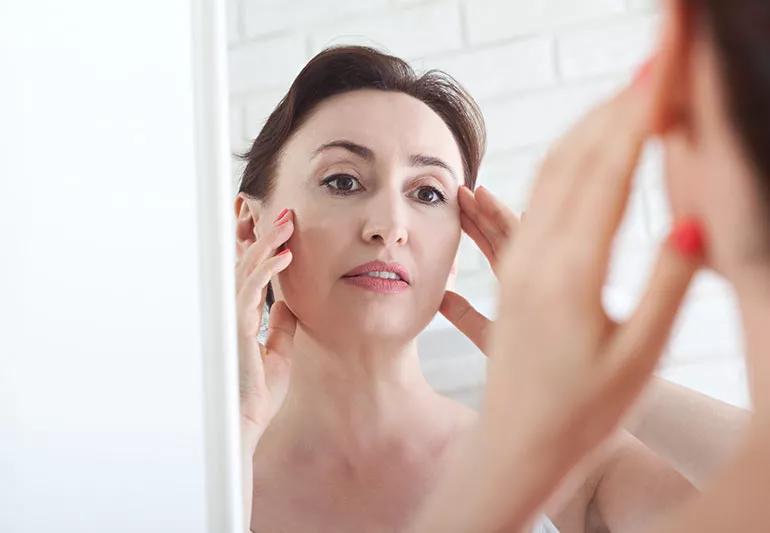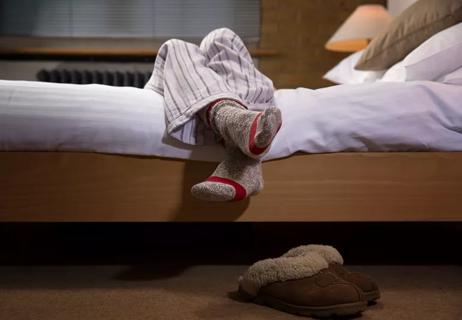Tips on how to cope with dry skin and hair

They don’t call menopause “the change” for nothing. This time of life, which begins 12 months after a woman’s last period, triggers changes throughout her body. You may welcome some of these changes — no more PMS! — but others may not be as enjoyable.
Advertisement
Cleveland Clinic is a non-profit academic medical center. Advertising on our site helps support our mission. We do not endorse non-Cleveland Clinic products or services. Policy
Take, for instance, the way skin and hair may change after menopause. Dermatologist Kiyanna Williams, MD, discusses how your skin and hair might look different after your periods are done — and what you can do about it.
If you’re seeing changes in your hair and skin post-menopause, you can usually blame rapidly declining levels of the hormone estrogen.
“Estrogen promotes water retention and plumpness in the skin,” Dr. Williams says. “When estrogen drops, you lose some of the molecules that help keep the skin moisturized. Estrogen also contributes to hair growth and fullness. Without it, your hair may become thinner.”
These are the most common changes you may be able to expect in your skin and hair post-menopause.
Collagen is a protein that holds the body’s tissues together. And when estrogen drops, your skin’s collagen production decreases, too. Loss of collagen means the skin loses its youthful volume and tightness.
To combat this problem, many people take collagen supplements or eat high-collagen foods like bone broth. But the jury is still out on this strategy. “We don’t have enough controlled studies to prove that consuming collagen will help post-menopausal skin,” Dr. Williams says.
Advertisement
Don’t give up, though. You can help fight collagen loss at home with a simple facial massage. Dr. Williams recommends taking your favorite moisturizer or facial oil and giving yourself a facial rubdown each night. “The massaging motion stimulates your skin’s collagen production,” she says.
You can usually manage post-menopause skin dryness with a good home care routine. Dr. Williams recommends:
If you see redness or rashes, see your doctor. A dermatologist can rule out issues like eczema, rosacea or allergic reactions and help you find a solution.
Those pesky dark marks, sometimes called age spots, often appear after menopause and they’re hard to treat at home.
“Dark spots may not always respond to over-the-counter creams,” says Dr. Williams. “There are several prescription creams that can help such as tretinoin which is a prescription-strength retinoid. If that’s not enough, in-office facial peels or laser treatments can fade individual spots and enhance the overall brightness and youthful appearance of the skin. Ask your dermatologist about these options.”
As hormones shift, you may notice hair on the upper lip or chin. If you want it gone, the tried-and-true methods of tweezing, waxing, hair removal creams and threading will get rid of it — until it grows back.
Electrolysis is a permanent hair removal solution. It destroys the growth cells in hair follicles, so they can’t grow back. Most people need several appointments to get results. If you decide to go this route, choose a licensed electrologist or ask your doctor for a recommendation.
Laser hair removal can get rid of unwanted facial hair — but there’s a caveat. “The laser targets melanin, which gives hair and skin its color,” says Dr. Williams. “Laser treatment only works on dark hair. If your unwanted hair is light, the laser won’t work.”
Advertisement
Unfortunately, menopause doesn’t mean the end of pimples. Some women get acne throughout their lives while others get more acne when estrogen levels drop after menopause.
If you notice post-menopause breakouts, don’t slam them with the strongest acne product you can find. Many of the acne products on store shelves are too harsh and drying for adults. Try a gentle cleanser that contains salicylic acid. If over-the-counter products aren’t working, see your dermatologist for a prescription solution.
Estrogen promotes hair growth, density and fullness. During menopause, you may notice that your hair is thinning, less full or shedding more.
“Treat your scalp like fertilizer that you want to optimize for hair growth,” says Dr. Williams. “If your scalp is dry, use gentle, moisturizing shampoos and wash it less frequently. If your scalp is oily, however, you may want to shampoo every day. This varies from person to person.”
And older adults are more likely to experience androgenic alopecia, often called male or female-pattern baldness. It can cause overall thinning or bald spots. Over-the-counter products with the ingredient minoxidil can help.
Finally, if you notice any of these signs, see your dermatologist:
Advertisement
No matter what your skin challenges are, sunscreen is your friend. Slather it on every day, all year round. Sun protection can ward off signs of aging and prevent skin cancer.
Use a broad-spectrum sunscreen that’s SPF 30 or higher. Choose one you like so you’ll be more likely to apply it every morning. If you’re going to be outside, reapply every two hours or after swimming, sweating or toweling off.
“The sun’s rays age your skin and increase the risk of skin cancer,” Dr. Williams says. “Even in the winter, UV rays penetrate the clouds.”
We may not like what time and hormone changes do to our skin and hair. But you have the power to maximize your well-being. Eat a healthy diet, get regular exercise, don’t smoke and see your doctor regularly. If you make good health a priority, you’ll feel — and look — your best.
Advertisement
Learn more about our editorial process.
Advertisement

Estrogen loss contributes to bone loss, which significantly raises your risk of osteopenia and osteoporosis

Making certain changes to your diet, sleep habits and even your wardrobe may help lessen the impact of menopause symptoms

A women’s health specialist explains those cold flashes that come on quickly

Changing hormone levels can bring issues like brittle nails, indigestion, dry skin and new allergies (to name a few!)

The choices you make at mealtime could reduce hot flashes or make them worse

If you’ve noticed changes in your mood and mental health while going through menopause, you’re not alone

Missed periods, heavy periods, painful sex and frequent hot flashes are just a few symptoms worth discussing with your provider

At-home tests measure FSH levels in urine, but they can’t actually diagnose menopause

Wearing a scarf, adjusting your outdoor activities and following your asthma treatment plan can help limit breathing problems

Your diet in the weeks, days and hours ahead of your race can power you to the finish line

When someone guilt trips you, they’re using emotionally manipulative behavior to try to get you to act a certain way